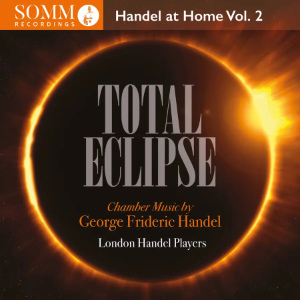
George Frideric Handel (1685-1759)
Total Eclipse – Handel at Home Vol. 2
London Handel Players
rec. 2023, St John the Baptist Church, Loughton, UK
Reviewed as a 16/44 download from Proper Music
SOMM Recordings SOMM0676 [76]
George Frideric Handel is undoubtedly one of the most popular composers of the baroque era in our time. Each year a number of recordings of his oeuvre are released, and there are hardly any opera houses which don’t include at least one of his operas in their schedule every year. That popularity is not a modern phenomenon; in his own time his music found many admirers, and this resulted in all sorts of arrangements.
Such arrangements were very common in his days. They were the only way to play his large-scale music that otherwise could not be performed by the many musical societies across England or at home. Unscrupulous publishers, such as John Walsh, explored the demand for his music by publishing arrangements of instrumental pieces and arias from his operas. In 1717 the composer William Babell published Suits of the Most Celebrated Lessons, a collection of harpsichord arrangements of opera arias by Handel and Giovanni Bononcini. The music historian Charles Burney judged them negatively, but one might wonder what Handel thought about them. He certainly did not object to the idea of arranging his arias, as he did so himself. Moreover, he notoriously reused material from his own works in new pieces, which is a different sort of arrangement.
The disc under review is the second that the London Handel Players devote to this subject. I have never heard the first; this is my first acquaintance with the ensemble’s arrangements. These are partly of their own making and partly created by Handel contemporaries. Unfortunately, the booklet does not inform us, who made the various arrangements; a list of sources would have been useful. The booklet does include some information about the context in which the arias are sung in Handel’s operas and oratorios. Obviously, true Handel lovers won’t need such information, as they are familiar with the works from which the arias are taken. Moreover, the programme has very much the character of “the best of”, as most arias are box-office hits, such as ‘Cara sposa’, ‘Lascia ch’io pianga’ and ‘Da tempeste’, which are often sung as encores.
It won’t come as a surprise that the more lyrical arias come off best. However, the aria from Samson, ‘Total eclipse’, is quite convincing here as well, and that is also due to the way it is played. Overall, the choice of tempi, the timing and the use of dynamics are well-judged, and help to make the listener feel the affects Handel wanted to communicate. Only in ‘Da tempeste’ I felt that something was missing; it is a bit too harmless and the tempo is a bit too slow.
‘Lascia ch’io pianga’ is one of Babell’s best-known harpsichord arrangements. Here, Silas Wollston plays his own arrangement which stays closer to the original aria by Handel, but he includes some elements of Babell’s version. ‘Ombra cara’ is Handel’s own arrangement, and that is interesting for the way he himself dealt with elements that are not easy to translate to the keyboard. “Handel’s aria arrangements also include elaborate, fully-notated ornamentation to the vocal line, and as such are an important reference point for singers learning to embellish his music”, according to the liner-notes. That is certainly true, but one should not overlook that ornaments that work on the harpsichord, cannot always be translated to the voice (or to another instrument, for that matter).
The Sonata in B flat is a bit different from the rest of the programme. It is questionable whether it is an arrangement, strictly speaking. “The manuscript suggests that oboes should double the tutti violin parts but since the violin writing frequently extends below the range of the oboe it seems appropriate here to omit them entirely and perform this work with just one player per part.” This means that basically nothing has been left out or adapted that was an essential part of the original concept. Even so, it is nice to hear it in this chamber music version, where it loses little or none of its impact.
For Handel lovers, this disc is a feast of recognition. Others, who like baroque instrumental music, may want to explore Handel’s operas and oratorios. They also can just sit back and enjoy this programme of instrumental music as it comes. The arrangements are such that one can also enjoy them without knowing much about their context. That is also due to the fine playing of the London Handel Players. I certainly see possibilities for a further volume.
Johan van Veen
www.musica-dei-donum.org
twitter.com/johanvanveen
Previous review: Göran Forsling (January 2024)
Buying this recording via a link below generates revenue for MWI, which helps the site remain free



Contents
Rinaldo (HWV 7):
Overture
Sinfonia – Cara sposa
Il vostro maggio
Lascia ch’io pianga
Sonata a 5 in B flat (HWV 288)
Samson (HWV 57):
Overture
Total eclipse
Thus when the sun
Radamisto (HWV 12):
Ombra cara
Giulio Cesare in Egitto (HWV 17):
Overture
Se pietà
Da tempeste
The Choice of Hercules (HWV 69):
Yet can I hear that dulcet lay

















